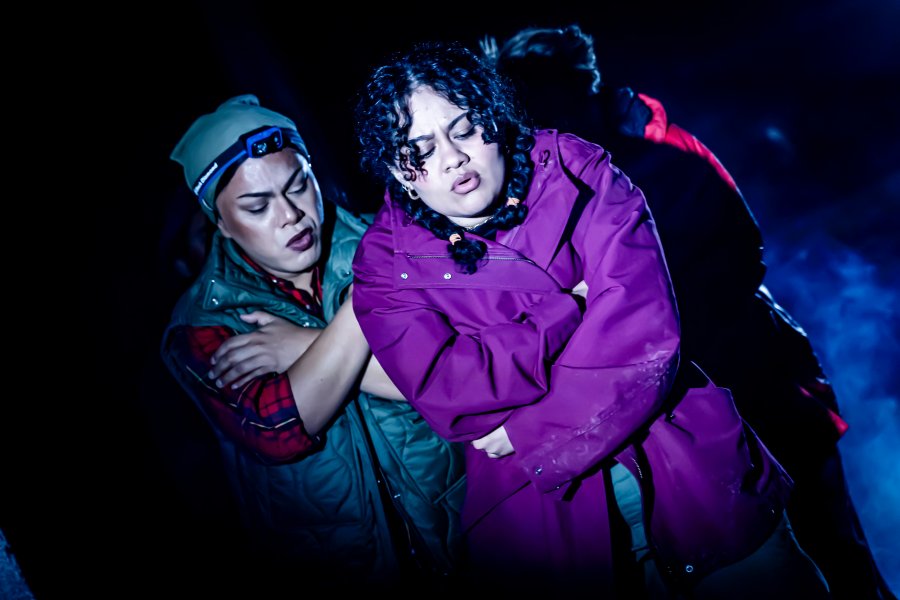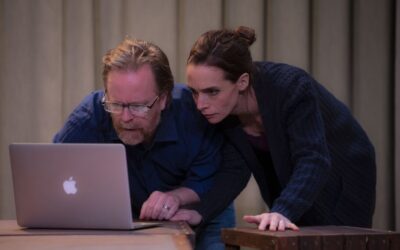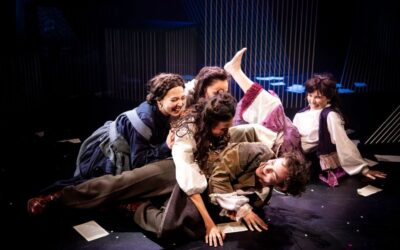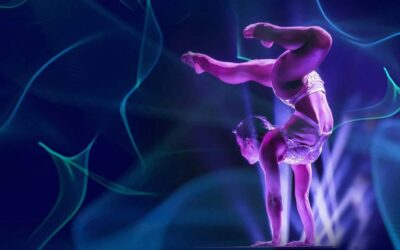By Rebecca Waese
Orlando, the first musical production by Antipodes Theatre Company, adapts Virginia Woolf’s novel of the same name, portraying a young, privileged artist who writes and loves, changes from a man to a woman, and lives almost 300 years. The production features five talented performers who each play Orlando and animate Woolf’s notion of “2052 selves lodging in the human spirit” at any one time.
This production shines a light on the mutable boundaries of gender and queer identities. Orlando begins with the performers entering the space in the darkness, each wearing a headlight torch that lights their path through rising white fog as they embark on their explorative journey. The set consists primarily of a rectangular expanse of rocks surrounding a small pond. Surprisingly, the aesthetic of the production in both the set and costumes, designed by Bethany J Fellows, builds upon camping. The costumes are contemporary and include hiking boots, raincoats, and sun hats. This was confusing at first, but, upon reflection, it taps into Woolf’s motifs of exploration and nature.
Distinctly contemporary Australian and Melbournian anachronisms inform the satire of production; two servants of Orlando wander along the Burwood Highway, near Kmart, quipping that “you might not remember us from the novel” as the lazy, privileged Orlando sleeps in before attempting to write a poem. There are selfies, talk of lovers “ghosting” Orlando, and references to limitations on who can compete in Olympic events. Class and race are addressed early in the performance as performer Manali Datar reminds the audience to consider the decapitated head that Orlando’s ancestors keep in their attic.
Flawed and spoiled, Orlando lives, loves, and learns. We see him try and fail at writing and loving. One of the most entertaining songs is a toe-tapping yodelling roast of Orlando’s playscript which is panned by his writing mentor, Mr. Greene. This is followed by another catchy ensemble song sung by Orlando with the cast clapping and singing around his head and body as he attempts to write his “thoughts and words” and be “Intellectual” and move on from his failed love with Russian princess Sascha and his rejection by Mr. Greene.
Physical highlights include a moment where the cast forms the shape of a large oak tree. In Woolf’s novel, “The Oak Tree” is the poem that Orlando attempts to write over 300 years. The performers, bathed in an amber light, grow into a majestic tree with wide branches. It is a quiet moment in the production, and beautiful, suggesting the growth and possibility of Orlando’s identity which can grow unrestrained in several directions. Performers later use their bodies create a fabulous neck ruffle around the Queen, and Sascha’s entrance on a scooter, gliding through the fog, disrupts the Victorian expectations delightfully.
The soundscape is haunting at times and richly layered with a solo violinist, Imogen Cygler, and Rachel Lewindon on vocals and keyboard synthesizer. Some songs are more memorable than others, but all the performers have strong voices and harmonise well.
Some of the less successful moments in the production are the transformation of Orlando from man to woman and the adventures of Lady Orlando. These moments come late in the show and feel less explored than Orlando’s life as a man. Orlando writhes comically in a cocoon-like camping bag, for quite some time. Anticipation mounts but the reveal is somewhat anti-climactic. She emerges and is pleased by her female body. Quickly, she experiences discrimination in a letter explaining she is not allowed to continue to own her property as a woman. There is another switching of roles at this point, another love affair, and some clarity is lost as the play rushes to an abrupt ending. However, the best lines of the play come at this point where Orlando reflects, “I ebbed and flowed over a very long time,” and Marmaduke, played by Louie Dalzell, exclaims, “If I stay, I stop becoming.”
While Woolf’s novel pushed boundaries in 1928 in exploring forbidden love between women – literary critics believe the novel is a thinly disguised love letter to Woolf’s friend and lover Vita Sackville – this modern musical adaptation of Orlando expands the focus to embrace a range of queer and non-binary identities as Orlando transforms and grows. The production is ambitious and entertaining, bemusing, and confusing. An eclectic 80-minute romp through three centuries, Orlando resonated warmly with the opening night audience who soundly applauded positive reflections of LGBTIQA+ characters.
Image: Angel Leggas at 3 Fates Media





